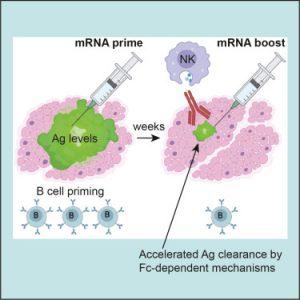The antibodies produced by your initial COVID vaccination or infection may adversely impact later booster injections, according to recent research (Figure 1). This is due to the booster being marked for eradication by antibodies before it has a chance to activate immune system cells.
The current research by Dangi et al., identifies possible techniques that could be modified in order to enhance the effectiveness of next-generation vaccines, such as creating vaccines that avoid pre-existing antibodies. A second booster injection quickly destroys the vaccine due to the antibodies produced after earlier vaccinations, which reduces the amount of an immune reaction that can be produced. This appears to be the product of so-called “antibody effector mechanisms,” which remove foreign substances from the body. This was not merely the result of rivalry between antibodies and B cells for the vaccine antigen.
The most recent research also makes a case for why the immune system responds better when immunisation intervals are extended. The reasons for this were unclear, but it is best to delay six months rather than two weeks before you enhance. Another explanation, however, is that the booster would stay in the body for an extended period of time as antibodies started to wane.
This research is thrilling because it can teach us how to create better booster immunisations. Millions of individuals around the globe receive mRNA boosters, which can be improved using this new fundamental mechanistic knowledge.
Journal article: Dangi, T., et al., 2023. Pre-existing immunity modulates responses to mRNA boosters. Cell Reports.
Summary by Stefan Botha











